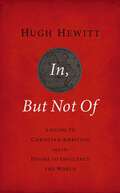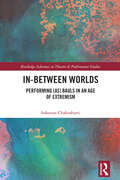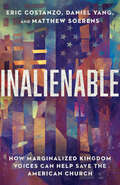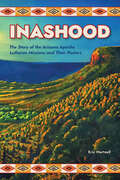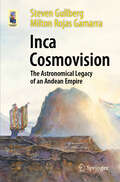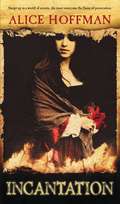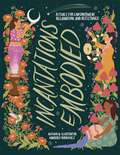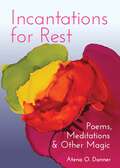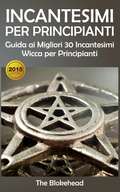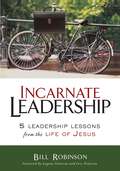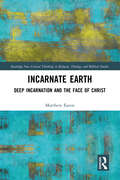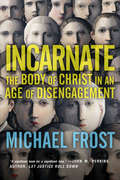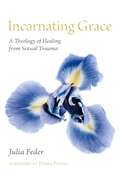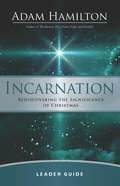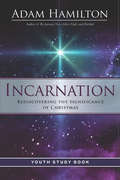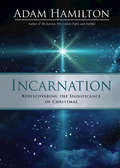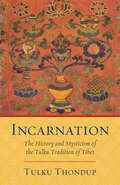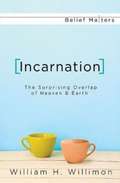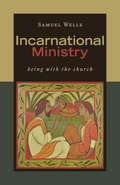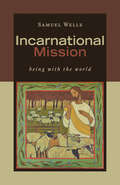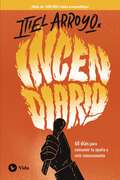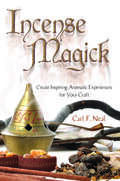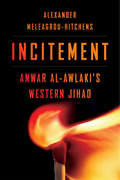- Table View
- List View
In, But Not Of Revised and Updated: A Guide to Christian Ambition and the Desire to Influence the World
by Hugh HewittInfluence is not accidental. It is earned. In, But Not Of charts the course to acquiring influence over the life of a career while remaining committed to the commands and example of Christ. Broadcast journalist and law professor Hugh Hewitt not only challenges us to become more engaged in steering the course of history through politics, law, finance, and entertainment, but he also maps out simiple, effective strategies that will enable us to bring our visions of influence to pass. Along with Hugh's simple and helpful advice, the study guide in the back focuses on key selections and questions to help the reader, whether in group or individual sessions, internalize these valuable principles and make a difference in the world. Divided into Think About It, Find Out More, and Take Action, the guide concludes with a Summary of Your Decisions to serve as a quick reference for years to come.
In-Between Worlds: Performing [as] Bauls in an Age of Extremism (Routledge Advances in Theatre & Performance Studies)
by Sukanya ChakrabartiThis book examines the performance of Bauls ‘folk’ performers from Bengal, in the context of a rapidly globalizing Indian economy and against the backdrop of extreme nationalistic discourses. Recognizing their scope beyond the musical and cultural realm, Sukanya Chakrabarti engages in discussing the subversive and transformational potency of Bauls and their performances. In-Between Worlds argues that the Bauls through their musical, spiritual, and cultural performances offer ‘joy’ and ‘spirituality,’ thus making space for what Dr. Ambedkar in his famous 1942 speech had identified as ‘reclamation of human personality’. Chakrabarti destabilizes the category of ‘folk’ as a fixed classification or an origin point, and fractures homogeneous historical representations of the Baul as a ‘folk’ performer and a wandering mendicant exposing the complex heterogeneity that characterizes this group. Establishing ‘folk-ness’ as a performance category, and ‘folk festivals’ as sites of performing ‘folk-ness,’ contributing to a heritage industry that thrives on imagined and recreated nostalgia, Chakrabarti examines different sites that produce varied performative identities of Bauls, probing the limits of such categories while simultaneously advocating for polyvocality and multifocality. While this project has grounded itself firmly in performance studies, it has borrowed extensively from fields of postcolonial studies and subaltern histories, literature, ethnography and ethnomusicology, and cosmopolitan studies.
Inalienable: How Marginalized Kingdom Voices Can Help Save the American Church
by Matthew Soerens Eric Costanzo Daniel YangThe American church is at a critical crossroads.
Inanna: Queen of Heaven and Earth
by Diane Wolkstein Samuel Noah KramerStories and hymns to Inanna and some history of the land which is now part of Iraq.
Inashood: The Story of the Arizona Apache Lutheran Missions and Their Pastors
by Eric HartzellIt's a missionary story unlike any you've heard before. Recipient of Concordia Historical Institute's Award of Commendation in 2023, Inashood tells the love story of dedicated Lutheran missionaries and the Apache people on eastern Arizona's Fort Apache and San Carlos Reservations. In 1893, German missionaries George Adascheck and John Plocher embarked on the very first world mission for their church to the Apache people at Fort Apache and San Carlos reservations to tell them about God and his great love for them in Jesus. Over time, these men and the Lutheran missionaries that followed after them were called Inashood, the Apache word for "pastor" (literally translated, "man in long black robe"). Pastor, missionary, and author Eric Hartzell weaves together reports, newspaper articles, photographs, and journals from the time period into a single, down-to-earth account of the missionaries and the people they served. In this book, you'll learn about the joys and challenges of mission work, the Apache culture, and so much more. Featuring a bit of humor and thought-provoking insights for sharing the gospel message with people from other cultures, this book will inspire you to share God's love and the truth of the gospel with others. Here's what people are saying about Inashood: "Pastor Eric Hartzell has provided a fascinating history of the Lutheran church and the White Mountain Apache people of eastern Arizona. Utilizing historical documents and other sources, Inashood is a story of devotion, persistence, and God's redemptive work among an Indigenous community in the American Southwest. Readers will appreciate Pastor Hartzell's meticulous research, his personal anecdotes, and his remarkable ability in keeping the gospel at the center of the narrative." –Matthew Sakiestewa Gilbert (Hopi), University of Arizona "This book is full of inspiring stories which document the first century of Apache Lutheran history. During 100 years more than 70 WELS missionaries and wives, beginning with my grandparents in 1893, shared God's love in Christ with generations of native Americans on Apache reservations in Arizona. Himself one of these missionaries, Hartzell's experience and research provide the inside scoop which makes this not only a monumental historical record, but also a tour which takes the reader on an informative and a memorable adventure." –Rev. David J. Plocher, author of "Apache Lutheran Mission Beginnings – From the Letters of John Plocher."
Inca Cosmovision: The Astronomical Legacy of an Andean Empire (Astronomers' Universe)
by Steven Gullberg Milton Rojas GamarraThe Inkas (Quechua spelling) worshipped the Sun, and their emperor was thought to be the son of the Sun. They conquered most of the Andes and their former empire is replete with examples of their astronomy. They used solar positions on the horizon for calendrical purposes and managed their crops and religious festivals in this manner. Many examples remain of their intentional light and shadow effects that demonstrate their sophisticated understanding of the Sun’s movement and of solar horizon events. Evidence of their astronomy can only be fully understood in its cultural context, and that is the focus of this book. Inka Cosmovision explores the cosmic worldview of the Inkas from the perspective of oral traditions passed from one generation to the next among the Inkas’ living descendants. You will learn about Inka astronomy in a way that you perhaps have never encountered. An author of the book is Quechua, a descendant of the Inkas, and what you will read benefits greatly not only from the field research of both authors, but from the many stories he learned from his parents and grandparents and from his Amauta, a highly respected Indigenous teacher of Inka culture. This book enlightens about Inka cosmovision as no other has before.
Incantation
by Alice HoffmanEstrella is a Marrano: During the time of the Spanish Inquisition, she is one of a community of Spanish Jews living double lives as Catholics. And she is living in a house of secrets, raised by a family who practices underground the ancient and mysterious way of wisdom known as kabbalah. When Estrella discovers her family's true identity--and her family's secrets are made public--she confronts a world she's never imagined, where new love burns and where friendship ends in flame and ash, where trust is all but vanquished and betrayal has tragic and bitter consequences. Infused with the rich context of history and faith, in her most profoundly moving work to date, Alice Hoffman's first historical novel is a transcendent journey of discovery and loss, rebirth and remembrance
Incantations Embodied: Rituals For Empowerment, Reclamation, And Resistance
by Kimberly RodriguezKimberly Rodriguez, a first-generation Xicana Indigena artist, poet, and activist, invites readers on a transformative journey of self-discovery and empowerment through her book, Incantations Embodied: Rituals for empowerment, reclamation, and resistance, serving as a catalyst for reclaiming our stories, truth, and power.In Incantations Embodied: Rituals for Empowerment, Reclamation, and Resistance, author Kimberly Rodriuguez takes readers on a profound and transformative journey towards self-discovery and empowerment. Within its pages lies a poignant exploration of the human experience, interwoven with elements of spirituality, healing, and personal growth. At its core, Incantations Embodied serves as a triumphant homecoming—a return to the essence of one's being. It invites readers to embark on a sacred journey, emboldening them to embrace their true selves with unwavering honesty and compassion. Through Rodriguez's captivating stories, enlightening prose, and enchanting rituals, this book becomes a powerful catalyst for reclaiming our stories, our bodies, our identities, our voices, and ultimately, our power. In a world where societal norms and expectations often stifle individuality and self-expression, Incantations Embodied stands as a resounding call to break free from these chains. It seeks to dismantle the oppressive narrative that has been ingrained in our collective consciousness, urging us to question and challenge the colonized structures that have kept us disconnected from our own truth. The book serves as a powerful guide for self-realization, urging individuals to transcend their limitations and embrace their innate potential. With each turn of the page, a profound shift occurs—a blossoming of self-awareness, strength, and resilience. "Incantations are our liberation. With the power of words, we become conjurers, bringing our wildest dreams to life." - Kimberly Rodriguez
Incantations For Rest: Poems, Meditations, and Other Magic
by Atena O. DannerA call to anyone who thought they were alone on the journey, Incantations for Rest is for kindred spirits: neurodivergent folks, parents up late past bedtime nursing resentment, Black people in predominantly white spaces—anyone who has found themselves at the edges of Beloved Community.Incantations for Rest is an invitation to slow down and explore every kind of rest, providing sacred space for those exhausted by the demands of a racist, ableist society. his stunning collection of poems, meditations, and magic by poet-activist Atena O. Danner is an examination of spiritual spaces, a love letter to Black well-being, and medicine for BIPOC people. Within these pages you are invited to savor connection, question assumptions, admit to complicated feelings, and still make room for joy. It is a beacon of affirmation and a vital tool for ritual and reflection.
Incantesimi Per Principianti: Guida ai Migliori 30 Incantesimi Wicca per Principianti
by The BlokeheadVoglio ringraziarti e congratularmi con te per aver dato un'occhiata a “Incantesimi Per Principianti, Guida ai Migliori 30 Incantesimi Wicca per Principianti”. Questo libro contiene passi collaudati e strategie su come far uso di diversi incantesimi Wicca, per aiutarti a migliorare lo stato attuale della tua vita, dall’incrementare la tua fortuna finanziaria al renderti più attraente quando si tratta d’amore, ci sono molti modi diversi nei quali questi incantesimi possono essere utilizzati. Infatti, nella loro creazione, la tua intenzione gioca un ruolo fondamentale.
Incarnate Leadership: 5 Leadership Lessons from the Life of Jesus
by Bill RobinsonWhitworth University president Bill Robinson highlights five qualities that characterized the leadership style of Jesus. Conversational in tone and seasoned with real-life stories from his own successes and failures as a leader, Robinson helps Christian leaders understand how to emulate the strong yet humble approach to leadership that Jesus used to establish his church.
Incarnate Earth: Deep Incarnation and the Face of Christ (Routledge New Critical Thinking in Religion, Theology and Biblical Studies)
by Matthew EatonIncarnate Earth reimagines the doctrine of Incarnation by extending the unity between Creator and creation beyond Jesus to the entire world. In dialogue with contemporary theologies of deep incarnation and the philosophy of Emmanuel Levinas, the author argues that the face of Christ is encountered in the cruciform demand for justice embodied in the creaturely finitude and vulnerability that grounds ethics. Central to this vision is a recognition that the religious role-functions at the heart of Jesus’ life—the revelation of God and the redemption of the world—are performed throughout the physical world, irreducible to humanity or one heroic representative of the species. Thus, the human encounters the divine Christ in and as the face of any vulnerable thing—animal, vegetal, elemental, or otherwise—not as a transcendent being mediated through humanity. The radical nature of this reimagination necessitates renewed discussions of ecological and animal ethics, calling for compassionate care for all vulnerable bodies insofar as this is possible. It will be of interest to scholars of Christian theology and the philosophy of religion, particularly those focused on ecotheology, religious naturalism, and environmental ethics.
Incarnate: The Body of Christ in an Age of Disengagement (Forge Partnership Books)
by Michael FrostOutreach2014 Best Book of Missional Theology, from Byron Borger, Hearts and Minds Bookstoreexcarnate.
Incarnating Grace: A Theology of Healing from Sexual Trauma
by Julia FederWINNER, COLLEGE THEOLOGY SOCIETY BOOK AWARDPrioritizes survivors of abuse by reexamining Christian ideals about suffering and salvation More than half of women and almost one in three of men in the United States have experienced sexual violence at some time in their lives. Yet our Christian tradition has failed survivors of sexual violence, who have been taught to believe that traumatic suffering brings us closer to God. Incarnating Grace attempts to save our broken ways of talking about God’s grace by unearthing liberating resources buried in the Christian tradition.Christian ideas about salvation have historically contributed to sexual violence in our communities by reinforcing the idea that suffering is salvific. But a God worth worshiping does not want human beings to suffer. Drawing on the sixteenth-century Spanish mystic Teresa of Avila as well as contemporary political and feminist theologians, philosophers, and legal scholars, author and Associate Professor of theology Julia Feder offers an account of Christian salvation as mystical-political.Feder begins by describing the breadth of traumatic wounding and the shape of traumatic recovery, as articulated by psychologists. Since the fullness of post-traumatic healing requires reserves deeper than those which can be articulated by the secular field of psychology alone, the book then introduces the Spanish Carmelite Saint Teresa of Avila and her theological insights, which are most helpful for constructing a post-traumatic theology of healing. Arguing that God stands against violence and suffering, the book also examines the notion of “senseless suffering,” a technical term that comes from Edward Schillebeeckx, a Catholic twentieth-century Flemish priest and theologian. The suffering of sexual violence serves no higher purpose or greater human value and pushes against all ways of making sense of the world as good and orderly. In the following chapters, Feder turns to two Christian virtues that animate post-traumatic recovery, courage and hope, and explores how Christian hope can provide a language to empower courageous activity undertaken toward healing.Incarnating Grace opens a new dialogue about salvation and violence that does not allow evil to have the last word.
Incarnation Leader Guide: Rediscovering the Significance of Christmas (Incarnation)
by Adam HamiltonHis parents gave him the name Jesus. But the prophets, the shepherds, the wise men, and angels addressed him by other names. They called him Lord, Messiah, Savior, Emmanuel, Light of the World, and Word Made Flesh.In Incarnation, best-selling author Adam Hamilton explores the meaning of these titles and what they tell us about the child whose birth we celebrate at Christmas. Join him and reflect upon the significance of the Christ-child for our lives and world today!Chapter topics include: The Royal Titles: Lord and Messiah The Deliverer’s Title: Savior The Incarnate Title: Emmanuel The Light of the World Epilogue: The Word Made FleshThe Leader Guide contains everything needed to guide a group through the four-week study including session plans, activities, and discussion questions, as well as multiple format options.
Incarnation Youth Study Book: Rediscovering the Significance of Christmas (Incarnation)
by Rev Adam HamiltonHis parents gave him the name Jesus. But the prophets, the shepherds, the wise men, and angels addressed him by other names. They called him Lord, Messiah, Savior, Emmanuel, Light of the World, and Word Made Flesh.In Incarnation, best-selling author Adam Hamilton explores the meaning of these titles and what they tell us about the child whose birth we celebrate at Christmas. Join him and reflect upon the significance of the Christ-child for our lives and world today!Chapter topics include: The Royal Titles: Lord and Messiah The Deliverer’s Title: Savior The Incarnate Title: Emmanuel The Light of the World Epilogue: The Word Made Flesh This Youth Study Book takes the ideas presented in Adam Hamilton’s book and interprets them for young people grades 6-12.
Incarnation: Rediscovering the Significance of Christmas (Incarnation)
by Adam HamiltonBe Transformed this Advent Season!His parents gave him the name Jesus. But the prophets, the shepherds, the wise men, and the angels addressed him by other names. They called him Lord, Messiah, Savior, Emmanuel, Light of the World, and Word Made Flesh.In Incarnation: Rediscovering the Significance of Christmas, best-selling author Adam Hamilton examines the names of Christ used by the gospel writers, exploring the historical and personal significance of his birth.This Advent season church families will come together to remember what’s important. In the face of uncertainty and conflict, Christians reclaim the Christ Child who brings us together, heals our hearts, and calls us to bring light into the darkness.Now more than ever, we invite you to reflect upon the significance of the Christ-child for our lives and world today!Incarnation is a standalone book, but works beautifully as a four-week Bible study experience perfect for all age groups during the Advent season. Additional components include a comprehensive Leader Guide, a DVD with short teaching videos featuring Adam Hamilton, as well as resources for children and youth.
Incarnation: The History and Mysticism of the Tulku Tradition of Tibet
by Tulku ThondupA tulku is a fully enlightened one (buddha) or highly accomplished adept (siddha) who chooses to be reborn again and again for the benefit of all beings. Most tulkus, though, are the rebirths of well-trained masters who are engaged in spiritual training and serving others. Tibetan Buddhists have, for well over a millennium, been meticulously following the tradition of finding, recognizing, enthroning, training, and venerating these revered figures who provide teachings of liberation for both monks and laypeople. This guide to the tulku tradition covers its long history, separating fact from fiction, giving an overview of how the system works, and providing short biographies of some of the great tulkus of the past and present. Included are accounts of the magical occurrences that are associated with these remarkable beings, and advice for how anyone can set out on the tulku path.
Incarnation: The Surprising Overlap of Heaven & Earth
by William H. WillimonJesus defies simplistic, effortless, undemanding explications. To be sure, Jesus often communicated his truth in simple, homely, direct ways, but his truth was anything but apparent and undemanding in the living. Common people heard Jesus gladly, not all, but enough to keep the government nervous, only to find that the simple truth Jesus taught, the life he lived, and the death he died complicated their settled and secure ideas about reality. The gospels are full of folk who confidently knew what was what--until they met Jesus. Jesus provoked an intellectual crisis in just about everybody. Their response was not, "Wow, I've just seen the Son of God," but rather, "Who is this?"--from the IntroductionThe church uses the concept of "Incarnation," (from the Latin word for "in the flesh") to help us understand that Jesus Christ is both divine and human. The Incarnation is the grand crescendo of our reflection upon the mystery that Christ is the full revelation of God; not only one who talks about God but the one who speaks for and acts as God, one who is God.
Incarnational Ministry: Being with the Church
by Samuel WellsWith may be the most important word in the Christian faith. In the Trinity, as Samuel Wells points out, we see the eternal persons of the Godhead being with each other. In the Gospels we see Jesus being with the people he encounters, mediating God's grace to them with his own incarnational presence. Those in ministry are likewise called to the task of being with—with God, with the church, and with the created world and those who dwell in it. In Incarnational Ministry Wells elaborates on the concept of being with in eight dimensions: presence, attention, mystery, delight, participation, partnership, enjoyment, and glory. His vivid narratives and wise reflections will challenge readers to deeper discipleship and more vital ministry as they explore what it means to be with the troubled, the hurt, the afflicted, the challenged, the dying—and all who are embraced by the church's incarnational ministry.
Incarnational Mission: Being with the World
by Samuel WellsA bold new way of thinking about Christian mission&“With,&” says Samuel Wells, &“is the most important word in the Christian faith.&”In this compelling follow-up to Incarnational Ministry: Being with the Church, Wells explores what it means for mission-minded Christians and churches to be with the world.Drawing on the Gospels, Acts, and personal insights gleaned from his more than two decades in ministry, Wells elaborates on the concept of being with in eight dimensions: presence, atten-tion, mystery, delight, participation, partnership, enjoyment, and glory. His vivid narratives and wise reflections will help Christian readers better understand how to be with all kinds of people outside the church, both individually and collectively.CONTENTSPrologue: Not of This FoldIntroduction: The Mission of Being With1. Being with the Lapsed2. Being with Seekers3. Being with Those of No Professed Faith4. Being with Those of Other Faiths5. Being with the Hostile6. Being with Neighbors7. Being with Organizations8. Being with Institutions9. Being with Government10. Being with the ExcludedEpilogue: Are You Hungry?
Incarnational Mission: Being with the World
by Samuel WellsA bold new way of thinking about Christian mission&“With,&” says Samuel Wells, &“is the most important word in the Christian faith.&”In this compelling follow-up to Incarnational Ministry: Being with the Church, Wells explores what it means for mission-minded Christians and churches to be with the world.Drawing on the Gospels, Acts, and personal insights gleaned from his more than two decades in ministry, Wells elaborates on the concept of being with in eight dimensions: presence, atten-tion, mystery, delight, participation, partnership, enjoyment, and glory. His vivid narratives and wise reflections will help Christian readers better understand how to be with all kinds of people outside the church, both individually and collectively.CONTENTSPrologue: Not of This FoldIntroduction: The Mission of Being With1. Being with the Lapsed2. Being with Seekers3. Being with Those of No Professed Faith4. Being with Those of Other Faiths5. Being with the Hostile6. Being with Neighbors7. Being with Organizations8. Being with Institutions9. Being with Government10. Being with the ExcludedEpilogue: Are You Hungry?
Incendiario: 40 días para consumir tu apatía y vivir intensamente
by Itiel ArroyoGalardonado por los Premios SEPA (Asociación de Editoriales Evangélicas) por el libro más vendido del año 2023 en la categoría Vida Cristiana y Mejor libro original en español 2023.Acompaña al predicador, autor, y mentor Itiel Arroyo en un viaje interactivo de 40 días para caminar intrépidamente en un mundo de apatía. Incendiario te desafía a buscar y encontrar la pasión que falta en tu vida y encender la llama del entusiasmo en tu corazón para vivir ardientemente para él y sus propósitos.La generación de hoy está rodeada de elementos que absorben sus pasiones y apagan la llama del entusiasmo en sus corazones. ¿Pero sabías que Dios quiere que vivamos vidas apasionadas? Nos creó a cada uno de nosotros con un propósito único y desea que vivamos con sentido e intención. Es más, ¡quiere que nos sintamos entusiasmados con nuestras vidas!Este diario interactivo contiene:Cuarenta capítulos cortos de alto impactoPropuestas interactivas a realizar en el diarioEspacios creativos para dibujar, pintar y hacer collagesDesafíos emocionantes para llevar a cabo en tu entornoPreciosas ilustraciones, anotaciones en letteringDiseño innovador para embellecer la lecturaIncendiario es una guía que te ayudará reenfocarte en lo eterno, para que tu apatía se consuma mientras sumerges tu corazón en el fuego de la pasión por Dios. Este diario te inspirará a ver a tu Creador, a las personas que te rodean, el dolor que sufren y el amor que comparten de una forma renovada y emocionante. Al final de los 40 días, estarás transformado y equipado para vivir con pasión, propósito y sin límites.Todo gran incendio comienza con una pequeña chispa. Este diario puede ser la chispa que ponga tu alma en llamas. Para siempre.IncendiaryJoin preacher, author, and mentor Itiel Arroyo on a 40-day interactive journey to walk fearlessly in a world of apathy. Incendiary challenges you to seek and find the passion that is missing in your life and ignite the flame of enthusiasm in your heart to live ardently for Him and His purposes.Today's generation is surrounded by elements that absorb their passions and extinguish the flame of enthusiasm in their hearts. But did you know that God wants us to live passionate lives? He created each of us for a unique purpose and wants us to live with meaning and intention. What's more, he wants us to feel excited about our lives!This interactive journal contains:Forty short, high-impact chaptersInteractive journaling promptsCreative spaces for drawing, painting, and collagingExciting challenges to carry out in your environmentBeautiful illustrations and lettering annotationsInnovative design to embellish the readingIncendiary is a guide that will help you refocus on the eternal, so that your apathy is consumed while you immerse your heart in the fire of passion for God. This journal will inspire you to see your Creator, the people around you, the pain they suffer and the love they share in a renewed and exciting way. By the end of the 40 days, you will be transformed and equipped to live with passion, purpose and without limits.
Incense Magick: Create Inspiring Aromatic Experiences for Your Craft
by Carl F. NealImmerse yourself in the enchanting, sensory-rich world of incense and deepen your knowledge of a treasured and indispensable tool for your magickal life. Carl F. Neal, author of the popular book, Incense, offers this meticulously researched, globespanning guide to the magickal applications of incense.From "redecorating" a room with the perfect scent to performing intricate incense ceremonies, you'll learn to create aromatic enchantments using pellets, seals, powders, and other incense forms in meditations, rituals, spells, and even games.Take your practice to a deeper level as you discover burning techniques and mystical uses, both traditional and innovative.Rituals specific to different types of incenseGuidance for selecting incense and charcoalAn alphabetized list of traditional and modern incense ingredients, including rare botanicalsCombustible: smudging, sticks (masala and joss), cones, cylinders, and dhoopsNon-combustible: pellets (moist), loose incense, and powdersIncense seals, trails, and chainsCorrespondences for the elements, seasons, particular intentions, and more
Incitement: Anwar al-Awlaki’s Western Jihad
by Alexander Meleagrou-HitchensThe definitive account of the career and legacy of the most influential Western exponent of violent jihad. Anwar al-Awlaki was, according to one of his followers, “the main man who translated jihad into English.” By the time he was killed by an American drone strike in 2011, he had become a spiritual leader for thousands of extremists, especially in the United States and Britain, where he aimed to make violent Islamism “as American as apple pie and as British as afternoon tea.” Alexander Meleagrou-Hitchens draws on extensive research among al-Awlaki’s former colleagues, friends, and followers, including interviews with convicted terrorists, to explain how he established his network and why his message resonated with disaffected Muslims in the West. A native of New Mexico, al-Awlaki rose to prominence in 2001 as the imam of a Virginia mosque attended by three of the 9/11 hijackers. After leaving for Britain in 2002, he began delivering popular lectures and sermons that were increasingly radical and anti-Western. In 2004 he moved to Yemen, where he eventually joined al-Qaeda and oversaw numerous major international terrorist plots. Through live video broadcasts to Western mosques and universities, YouTube, magazines, and other media, he soon became the world’s foremost English-speaking recruiter for violent Islamism. One measure of his success is that he has been linked to about a quarter of Islamists convicted of terrorism-related offenses in the United States since 2007. Despite the extreme nature of these activities, Meleagrou-Hitchens argues that al-Awlaki’s strategy and tactics are best understood through traditional social-movement theory. With clarity and verve, he shows how violent fundamentalists are born.
